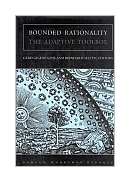|
||
• wydawnictwa polskie
• Zamów informacje o nowościach z wybranego tematu • kontakt
• Cookies na stronie |
BOUNDED RATIONALITY THE ADAPTIVE TOOLBOXGIGERENZER G.wydawnictwo: MIT PRESS , rok wydania 1999, wydanie Icena netto: BOUNDED RATIONALITY The Adaptive Toolbox Gerd Gigerenzer and Reinhard Selten, editors In a complex and uncertain world humans and animals make decisions under the constraints of limited knowledge, resources, and time. Yet models of rational decision making in economics, cognitive science, biology, and other fields largely ignore these real constraints and instead assume agents with perfect information and unlimited time. About forty years ago, Herbert Simon challenged this view with his notion of "bounded rationality." Today, bounded rationality has become a fashionable term used for disparate views of reasoning. This book promotes bounded rationality as the key to understanding how real people make decisions. Using the concept of an "adaptive toolbox," a repertoire of fast and frugal rules for decision making under uncertainty, it attempts to impose more order and coherence on the idea of bounded rationality. The contributors view bounded rationality neither as optimization under constraints nor as the study of people's reasoning fallacies. The strategies in the adaptive toolbox dispense with optimization and, for the most part, with calculations of probabilities and utilities. The book extends the concept of bounded rationality from cognitive tools to emotions; it analyzes social norms, imitation, and other cultural tools as rational strategies; and it shows how smart heuristics can exploit the structure of environments. It brings together experts from cognitive science, economics, evolutionary biology, and anthropology to create an interdisciplinary basis for understanding the rationality of the adaptive toolbox. Contents The Dahlem Konferenzen List of Participants Rethinking Rationality Gerd Gigerenzer and Reinhard Selten What Is Bounded Rationality? Reinhard Selten The Adaptive Toolbox Gerd Gigerenzer Fast and Frugal Heuristics for Environmentally Bounded Minds Peter M. Todd Evolutionary Adaptation and the Economic Concept of Bounded Rationality - A Dialogue Peter Hammerstein Group Report: Is There Evidence for an Adaptive Toolbox? Abdolkarim Sadrieh, Rapporteur Wemer Guth, Peter Hammerstein, Stevan Harnad, Ulrich Hoffrage, Bettina Kuon, Bertrand R. Munier, Peter M. Todd, Massimo Warglien, and Martin Weber The Fiction of Optimization Gary Klein Preferential Choice and Adaptive Strategy Use John W. Payne and James R. Bettman Comparing Fast and Frugal Heuristics and Optimal Models Laura Martignon Group Report: Why and When Do Simple Heuristics Work? Daniel G. Goldstein, Rapporteur Gerd Gigerenzer, Robin M. Hogarth, Alex Kacelnik, Yaakov Kareev, Gary Klein, Laura Martignon, John W. Payne,and Karl H. Schlag Emotions and Cost-benefit Assessment: The Role of Shame and Self-esteem in Risk Taking Daniel M. T. Fessler Simple Reinforcement Learning Models and Reciprocation in the Prisoner's Dilemma Game Ido Erev andAlvin E. Roth Imitation, Social Learning, and Preparedness as Mechanisms of Bounded Rationality Kevin N. Laland Decision Making in Superorganisms: How Collective Wisdom Arises from the Poorly Informed Masses Thomas D. Seeley Group Report: Effects of Emotions and Social Processes on Bounded Rationality Barbara A. Ateliers, Rapporteur Ido Erev, Daniel M.T. Fessler, Charlotte K. Hemelrijk, Ralph Hertwig, Kevin N. Laland, Klaus R. Scherer, Thomas D. Seeley, Reinhard Selten, and Philip E. Tetlock Norms and Bounded Rationality Robert Boyd and Peter J. Richerson Prominence Theory as a Tool to Model Boundedly Rational Decisions WulfAlbers Goodwill Accounting and the Process of Exchange Kevin A. McCabe and Vernon L. Smith 376 pages Księgarnia nie działa. Nie odpowiadamy na pytania i nie realizujemy zamówien. Do odwolania !. |


